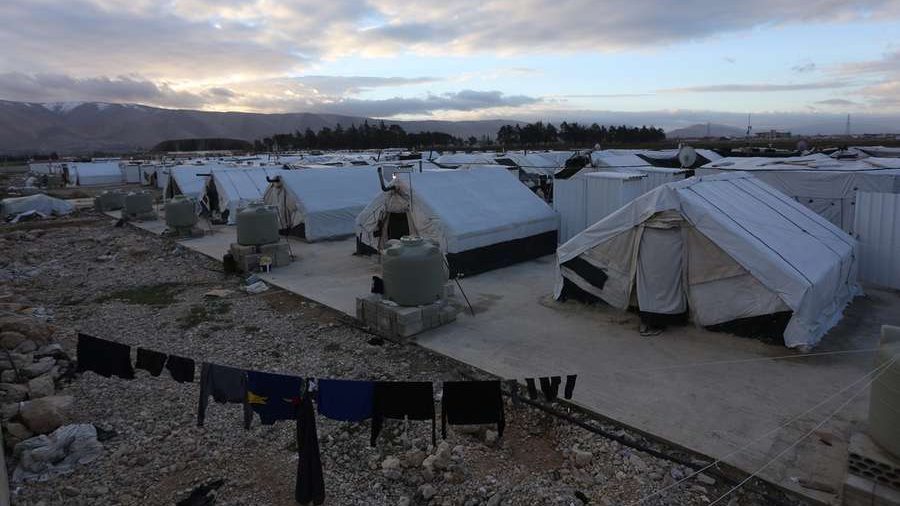A new report claims that the Syrian refugee crisis is severely burdening Lebanon’s limited resources and threatens its pluralism, requiring immediate international assistance.
“Lebanon is the last safe haven for Christians in the Middle East, and it is at a crossroads,” Toufic Baaklini, president of the group In Defense of Christians, stated on Tuesday upon release of the report “Displaced Syrians in Lebanon,” at the National Press Club in Washington, D.C.
“With civil unrest aimed at forming a new government, free from corruption and foreign influence, the Syrian Displaced crisis creates an even more critical burden on an already fractured system,” Baaklini said, adding that “Lebanon needs U.S. and international support” to find a solution moving forward.
The advocacy group In Defense of Christians (IDC) released the report on Tuesday with the Maronite Foundation, and presented it to Cardinal Mar Bechara Boutros al-Rahi, Patriarch of Antioch of the Maronites and All the East. The report was also presented to the White House and State Department, IDC said in a press release.
Since the Syrian civil war began in 2011, a continuing exodus of Syrians into neighboring Lebanon has substantially impacted the country’s labor force, contributed to scarcity in resources such as water and electricity, and increased the demand for public benefits such as health and education.
“The crisis has had a significant and direct impact on Lebanon; if no action is taken soon, it will remold its demographic equilibrium, socio-economic status, political and security environment,” the report stated.
Lebanon has recently been roiled by street protests against government corruption and mismanagement of finances, with clashes between nonsectarian protesters and supporters of Hezbollah.
On Oct. 27, Pope Francis exhorted citizens and government officials “to seek the right solutions in the way of dialogue” and prayed to “Virgin Mary, Queen of Lebanon” for continued “peaceful coexistence” and respect for human dignity in the country, in his Sunday Angelus address.
U.S. Catholic leaders have offered their prayerful solidarity as well. Archbishop Timothy Broglio, the U.S. bishops’ international justice and peace chair, and Carl Anderson, Supreme Knight of the Knights of Columbus, said in a Nov. 13 letter to Catholic patriarchs in the region, “Today, in Lebanon and Iraq, we are witnessing critical moments as protests grow against corruption and foreign interference,” and that “We pray that the effect of these protests will be a more just society for all the citizens of these two countries.”
They cited Pope St. John Paul II to say that Lebanon “is more than a country, it is a message of freedom and example of pluralism for East and West.”
Their letter was addressed to Cardinal Rai; Patriarch Ignatius Joseph III Younan, Primate of the Syriac Catholic Church; Patriarch Youssef Absi of Antioch of the Greek Melkites; Cardinal Louis Sako, Patriarch of Babylonia of the Chaldeans; and Gregory Petros XX Ghabroyan, Patriarch of Cilicia of the Armenian Catholic Church.
Although UN figures estimate the number of displaced Syrians in Lebanon at 1.6 million, with around one million registered refugees, the report counted around half a million Syrian migrant workers in Lebanon before the Syrian civil war added to that figure, bringing the total estimate to more than two million—around half of Lebanon’s population.
Out of the countries bordering Syria, Lebanon has received the greatest share of Syrian refugees at around 30%.
The U.S. has delivered $6.4 billion in assistance to Lebanon since 2013, the report said, but it’s only been a fraction of what is required. The current gap between received and required funds grew to 58% by 2018.
It has had problems with an average of 25% unemployment—among youth the percentage skyrockets to 37%. Syrians displaced in Lebanon have only exacerbated the high unemployment rate, adding 400,000 to the labor force.
Demand for public health services has increased by 40% due to the influx of Syrians, the report estimated.
Its debt-to-GDP ratio had ballooned to 151%, and could spike to 180% by the year 2023. Furthermore, 30% of Lebanese are living at the national poverty line and 10% are living in extreme poverty.
The influx of Syrians has also affected the country’s demographic balance; Lebanon’s government and social system is comprised of Christian, Shia and Sunni Muslim factions.
Among the report’s recommendations are that displaced Syrians be resettled in a “safe zone” in Syria’s northeast.

